If the partition project fails, Arabs must erect a statue of Zafrulla Khan as a tribute to his determination and wise logic
Ghulam Misbah, Lecturer, Jamia Ahmadiyya Canada
When it comes to Sir Muhammad Zafrulla Khanra, religious extremists in Pakistan bury their heads in the sand, refusing to admit his services for Pakistan, let alone for the entire Muslim ummah. But his name is inscribed on the pages of history in such golden words that will never let him be ignored. Whether it is Palestine, Kashmir or any other major case of his time, he was always found fighting for the oppressed.
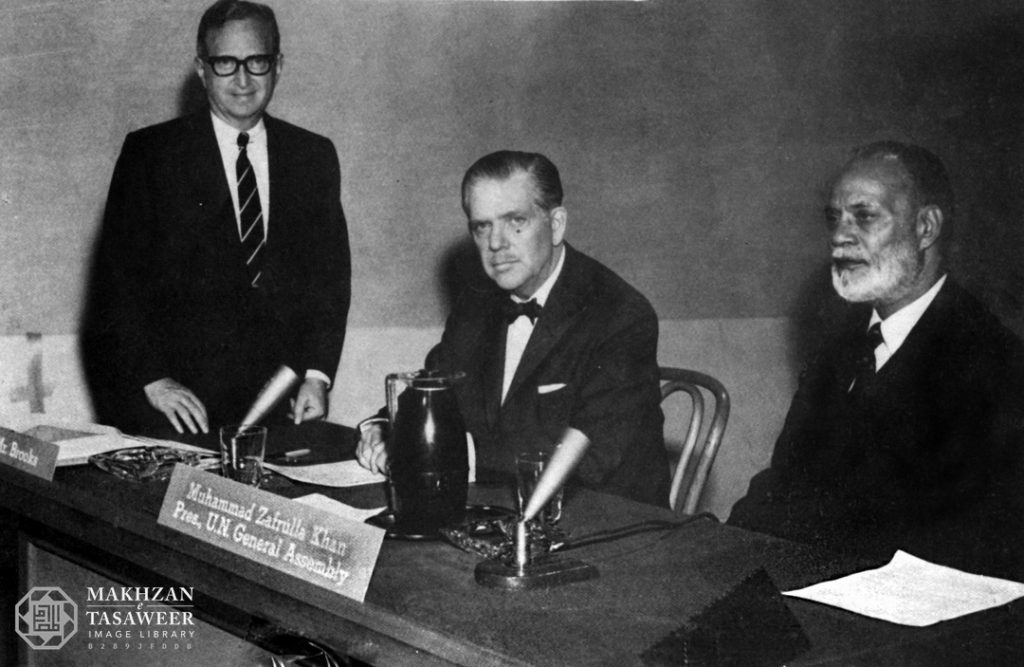
His significant efforts for the case of Palestine started in the 1930s, a glimpse of which can be read in his autobiography, Tehdis-e-Nemat. In it, he mentions his meetings with Sir Samuel Hoare, Secretary of State for India, and Sir Philip Cunliffe-Lister, Secretary of State for the Colonies, in this regard. Apart from this, international media coverage of his vigorous efforts for the Palestinian cause is also an undeniable proof. In 1945, on his way back to India, Sir Muhammad Zafrulla Khanra visited Palestine to personally observe the situation.
The Palestine Post, a local daily paper reporting under the heading, “Indian Moslem Leader Visits Palestine”, wrote:
“[…] he had come to see for himself the position of both Arabs and Jews. Though his sentiments were with the Arabs and his Moslem brothers […]”. (The Palestine Post, Jerusalem, Thursday, 4 October 1945, p. 3)
Immediately after the independence in 1947, under the directions of Quaid-e-Azam, Muhammad Ali Jinnah, Sir Zafrulla Khanra led Pakistan’s delegation to the United Nations for admission to its membership. It was during this visit that the Russo-American proposal to split the Holy Land into Jewish and Arab states was in the UN’s agenda. Sir Zafrulla Khanra took an active part against the proposal with his mastery of knowledge and persuasive arguments.
On Tuesday, 7 October 1947, three speakers were scheduled to present their views in the ad hoc committee session on Palestine, including Sir Zafrulla Khanra, but he was the only one who spoke. He made a 115-minute historical speech which resulted in attention-grabbing headlines all over the world.

The Leader-Post of Regina, Saskatchewan, Canada reported under the heading “Pakistan backs-up Arab case”:
“From non-Arab Pakistan has come the most lucid exposition of the Arab case and most damaging analysis yet heard of the majority Palestine report. A Zionist filibustering charge has been hurled at pale, grey-jowled Sir Mohammed Zafarullah Khan, whose comprehensive two-hour survey kept waiting Czech and Polish delegates off the floor. It would seem profitable here to disregard his highly illuminating discussion of the historic Anglo-Arab correspondence and to deal instead with those arguments directly relating to the majority findings.
“Panama’s Dr. Keyes had cited Ireland and India as examples of partition settlements Pakistan was born of Indian partition. For Pakistan Moslems partition was a credo and the essence of politics. Sir Mohammed, nonetheless, denied the analogy, arguing that in the Indian provinces Hindu and Moslem majorities had been established for centuries requiring no artificial creation stimulated by foreign funds. He insisted also that in India partition was founded upon mutual agreement and consent, prerequisites absent in Palestine. Partition was ‘physically and geographically a monstrosity from all other points of view.’ Even so, it might be accepted if it solved the Jewish problem. This is denied.
“Arabs in Majority
“The projected Jewish state embraces an estimated Jewish majority of 498,000, an Arab minority of 407,000. But the commissioners failed to include an Arab Bedouin population in Beersheba region, reckoned by the British at 91,000. These, say the Arabs, are settled Bedouins in the sense that their seasonal migrations do not take them across Palestine borders. The Jewish ‘majority’ therefore disappears.
“At least 180,000 of these Jews are concentrated, furthermore, in the single city of Tel Aviv, which implies a fairly heavy Arab preponderance in the rural areas. This admittedly is one reason for Zionist insistence on large scale immigration.
“But what will this mean for the Arabs? On the past record of the Jewish agency, clearly the end of restrictions on land purchase. This would spell Arab displacement, a process described as ‘inevitable’ in the report. It has been a fundamental principle of the Jewish fund that lands acquired should never revert to Arab control. What is to be the fate of the resultant landless proletariat? It is also axiomatic that Arab labor is to be hired only in cases of unavoidable necessity. Employment on the land is barred by threats of fines and even of forfeitures for third offences. The only remaining course would appear to be Arab migration. Would it not then have been more honest for the commission boldly to advocate a compulsory exchange of populations?
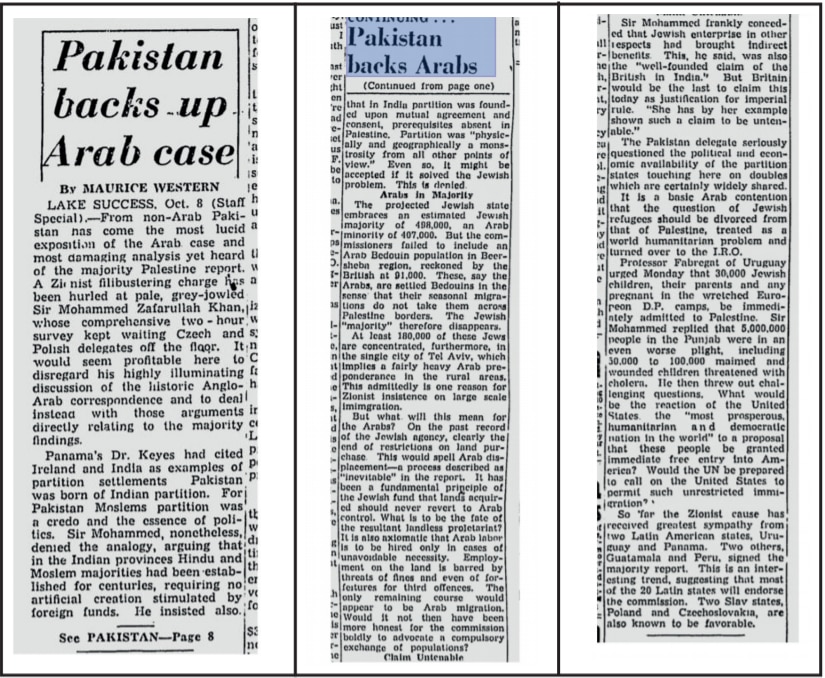
“Claim untenable
“Sir Mohammed frankly conceded that Jewish enterprise in other respects had brought indirect benefits. This, he said, was also the ‘well-founded claim of the British in India.’ But Britain would be the last to claim this today as justification for imperial rule. ‘She has by her example shown such a claim to be untenable.’
“The Pakistan delegate seriously questioned the political and economic availability of the partition states touching here on doubles which are certainly widely shared.
“It is a basic Arab contention that the question of Jewish refugees should be divorced from that of Palestine, treated as a world humanitarian problem and turned over to the I.R.O.
“Professor Fabregat of Uruguay urged Monday that 30,000 Jewish children, their parents and any pregnant in the wretched European D.P. camps, be immediately admitted to Palestine. Sir Mohammed replied that 5,000,000 people in the Punjab were in an even worse plight, including 50,000 to 100,000 maimed and wounded children threatened with cholera. He then threw out challenging questions. What would be the reaction of the United States the ‘most prosperous, humanitarian and democratic nation in the world’ to a proposal that these people be granted immediate free entry into America? Would the UN be prepared to call on the United States to permit such unrestricted immigration? […]” (The Leader-Post, Wednesday, 8 October 1947, pp. 1-8)
The subheading in The Palestine Post was:
“The Pakistan delegate, Sir Mohammed Zafarullah Khan, who opened today’s debate, told the Committee that the proposed Partition plan for Palestine was ‘physically and geographically a monstrosity.’ The plan had ‘glaring iniquities’ and was ‘thoroughly inadequate’, he said.” (The Palestine Post, Jerusalem, Wednesday, 8 October 1947, p. 1)
Damascus based newspaper, Alif Ba reported:
[Arabic translation] “[…] the first speaker was Pakistan’s delegate, Sir Zafrulla Khan, who said […] ‘This project is terrible, and if it were to be implemented despite it being oppressive directly to the rights of Arabs, it will be the spark of initiating a war in the Middle East. And it will make the whole world lose confidence in the committee of the UN.” (Alif Ba, Wednesday, 8 October 1947, p. 1)
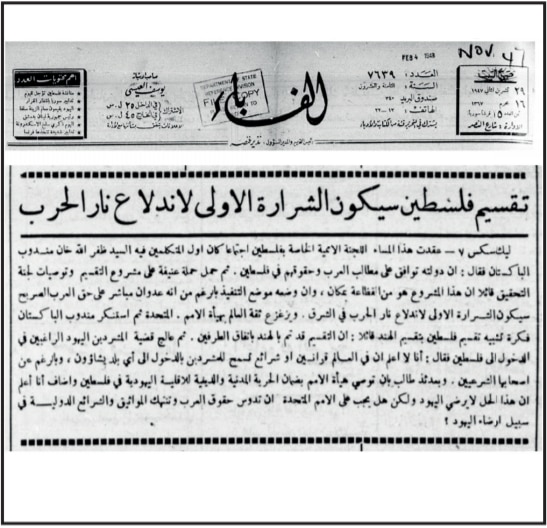
The Indian Express stated:
“Sir Zafrullah spoke for 115 minutes, occupying the whole session. Sir Zafrullah Khan established a record at least for this session of the General Assembly by his masterly speech. This was his first contribution to United Nations debates and it evoked this comment from an Arab Spokesman, ‘It was the most brilliant and exhaustive survey of the Arab case regarding Palestine I have ever heard.’ (The Indian Express, Madras, Wednesday, 8 October 1947, pp. 1-5)
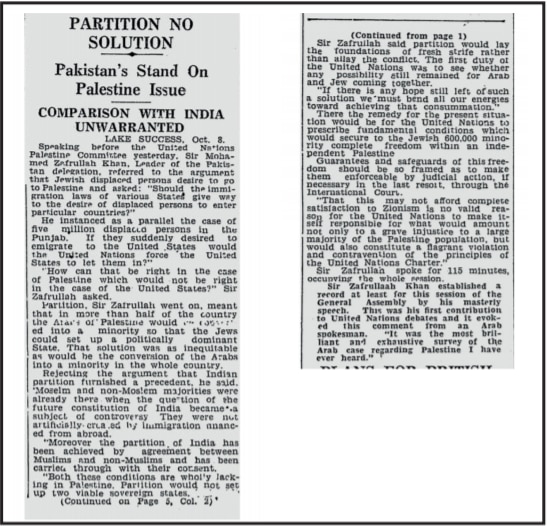
Though some Jewish and pro-Jewish papers called this speech a mere “filibuster”, it really gladdened the Muslim world especially the Arabs who truly believed it to be the most powerful defence on their behalf.
An Egyptian daily newspaper, Al-Balagh, under the heading of “The Palestinian Problem and the effect of the address of the Pakistani Representative”, wrote:
[Arabic translation] “The Arab news’ special reporter stated that an unbiased representative has described the address of Sir Zafrulla Khan while advocating for the Palestinian Arabs in the special committee meeting that it was a silencing and irrefutable address. It is also mentioned that his address had a massive impact on many of the other unbiased representatives.
“Upon finishing his address after two hours, Arab representatives headed towards Sir Zafrulla Khan to greet him. Mr Jamal Alhusaini, a member of the Arab Committee, Dr Jamali, the representative from Iraq, and Mr Kamil Shamoon, the representative from Lebanon, all said to me that the representatives from Pakistan had defended the Arabs very well.
“There is no doubt that Sir Zafrulla Khan chose to present his address at a time when America was about to present its political plans, which is why we saw in his address at various times him referring to them while speaking about the Zionists; especially when he spoke about the fundamental conflict between the US politics and the statement of Mr Truman who had said that the right of people to decide their future is one of the essential rituals that the external politics of the US rely on.
“And there is no doubt that the address of Sir Zafrulla Khan is the most truthful defence of the Arabs to date, though I had initially thought that he was speaking just to better the relationship between Pakistan and the Arab countries.
“Some of the Indian sources have mentioned that the fact that Pakistan is defending the Arabs, could make the Indian representatives remain firm and strict on their stance in that regard, though the representative from India was one of the supporters for the suggestions presented in favor of the minority.” (Al-Balagh, Cairo, 8 October 1947, p. 2)
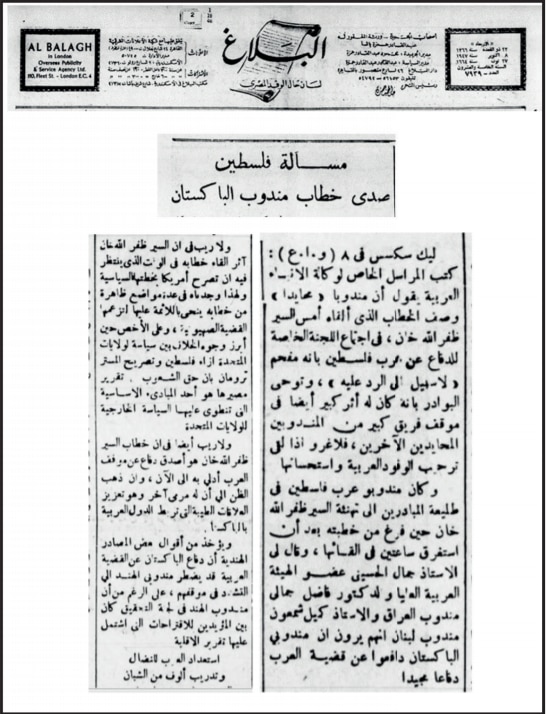
Sir Zafrulla Khanra also served as chairman of the Arab sub-committee.
An Arabic daily newspaper, Falastin reported his 10 questions to the assembly. (Falastin, Jaffa, 20 November 1947, p. 1)
About the same meeting, a Jewish newspaper in America wrote:
“Pakistan’s bearded, charming Sir M. Zafarullah Khan did his utmost to defend the Arab statement. As chairman of Committee No. 2 he fulfilled his task with dignity.” (The Wisconsin Jewish Chronicle, Milwaukee, 28 November 1947, p. 3)
On 28 November 1947, just a day before the resolution of the partition was passed in the UN, Sir Muhammad Zafrulla Khanra made yet another zealous speech showing his strenuous support for Palestine.
A daily newspaper of Jaffa, Al-Difaa, reported:
[Arabic translation] “Sir Zafarullah Khan once again stood against the partition in a great way. His attempt of presenting his statement was also very intelligent as he called upon all attendees to think logically about what was happening. He said that the committee had decided to commit the most violent pressure that would ever be seen. And they had intended to launch a project that would be against justice, logic and the law. There is not an iota of common sense in their logic, and stinging words.
“The reporter says, I have even heard one of the Arab representatives say that if the partition project fails, the Arabs must erect a statue of Sir Zafarullah Khan, as a tribute to his determination and wise logic when he said that if this project was to be enforced upon the Arabs, then the Arabs of the Holy Land would become its victims, and this decision would leave an untreatable scar on this worldwide conference, and it would make the Western world suspicious in all their activities in the third world countries of Africa and Asia. As I am telling you the truth that this project will completely abolish peace.” ([Daily] Al-Difaa, Sunday, 30 November 1947, p. 4)
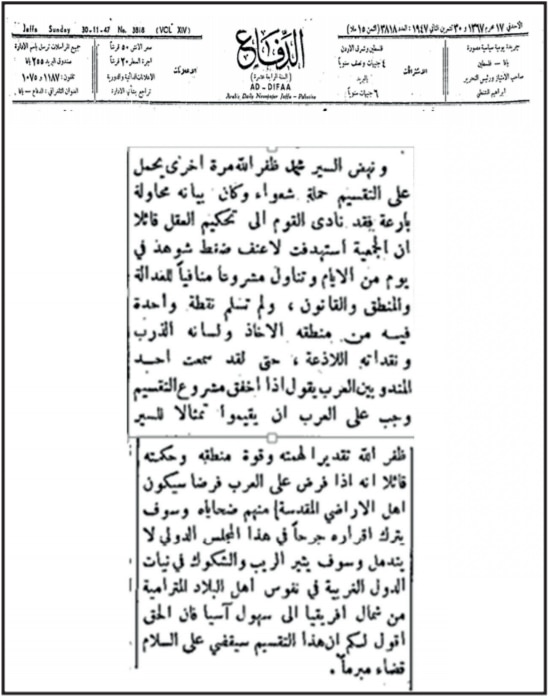
The daily Falastin also published the same report in its 30 November issue.
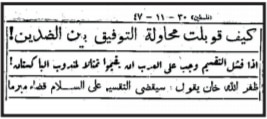
After this visit to the USA, Sir Muhammad Zafrulla Khanra, on his way back to Pakistan, also visited the Middle East where he was given a warm welcome. The honour and privilege he had in Arab countries requires a separate article. In spite of that, unfortunately, today, some people want such a heroic figure to be forgotten and consigned to the dust-heap of history.

